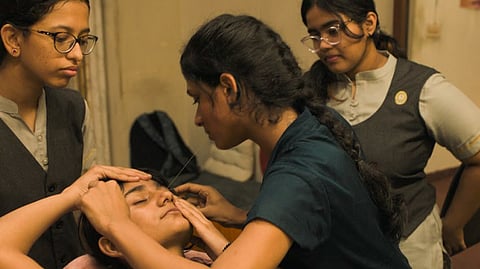Victoria review: Sivaranjini’s debut set in a beauty parlour is a calming watch
Victoria (Malayalam)(4 / 5)
Walking into a beauty parlour in her flowy blue kurta with a fluttering chicken in her hands, Victoria is about to begin a defining day in her life, its most tumultuous parts camouflaged by the demands of work. For women entering the parlour, it seems possible to leave your troubles behind for a bit and stretch your legs in the company of others. Even Victoria, with her troubled mind, loses herself in the affairs of the women when she is with them. The whole setting, part of an 84-minute Malayalam film titled Victoria, is somehow just as calming for the viewer.
It is hard to believe that Sivaranjini J, the director of the film, is a debutante. The film, made as part of the Kerala government project to fund women filmmakers, was made amid many limitations, but little of it shows in the outcome. Sivaranjini has placed most of her script in the shuttered space of a parlour in Angamaly, a small town in Kochi made famous by movie references in the past (the ‘Angamaly prime minister’ line in Kilukkam and the title of Lijo Jose Pellissery’s movie Angamaly Diaries).
The parlour door bears the sign: no men allowed, like a warning. As she begins her work at the parlour, Victoria (played by Meenakshi Jayan) is stuck with a ‘nercha kozhi’ – a chicken promised as an offering to church. Watching her go about her routine work of the day – cleaning the place, setting things up – you wouldn’t guess she’s up to her neck in trouble. Only when she locks herself in the restroom and opens her phone does she allow her feelings to surface. Her parents had caught on to her intercaste relationship and the marks of a slap are still fresh on her face. Victoria makes hurried and hushed calls, letting out her angst, but it gets her little respite.
When she is out of that claustrophobic space (and lets you breathe free), she seems wrapped up in work and with the women asking for her service. Here, you take a moment to appreciate the labour, for Meenakshi clearly equipped herself with the intricacies of parlour work. The way she expertly moves her hands around the equipment and the women’s faces and hair, Meenakshi might have worked in a parlour for years.
The actor is a marvel to watch, letting the emotions fall off her face, only to be replaced by the impassivity of a professional. As the assistant beautician, she is fully there – this will look good on you, she tells a woman, shall I try this on you, she asks another. It is also a reminder that people can just as easily hide behind their work faces while they suffer within and it is up to a close and caring one to reach out. Sreeshma Chandran, playing her pregnant friend, sees the marks of slap that no one else had. In the few moments Victoria pours out her emotions, inside the restroom or to her friend, there is not the slightest hint of drama. Sivaranjini clearly holds the reins at all moments of the 84-minute act.
Interpretations can be many and different – the rooster being read as a symbol, the absence of men altogether. But if you were as lost as I was, you may not notice the absence of men, it seemed like a perfectly natural state of affairs. You’d only wish that the annoying voice of the man in Victoria’s phone calls could also somehow be muted.
It is especially wonderful to be lost in a flurry of women’s conversations – the ones that flow free in a space where there is no one to stop them. Steeja Mary as Deepa, who can’t stop telling tales, Jolly Chirayath, playing a first-time visitor, and Darsana Vikas, who runs the parlour, make the parlour conversations organic, witty, and enjoyable. In particular, a group of schoolgirls breaking into a song about the trappings of life is a lovely distraction. Anand Ravi’s camera moves expertly from one party to another in the limited space of the parlour.
You couldn’t ask for more from a debutante. Sivaranjini, let’s hope, is here to stay.
The film was screened as part of the 29th International Film Festival of Kerala.
Disclaimer: This review was not paid for or commissioned by anyone associated with the film. Neither TNM nor any of its reviewers have any sort of business relationship with the producers or any other members of its cast and crew.

